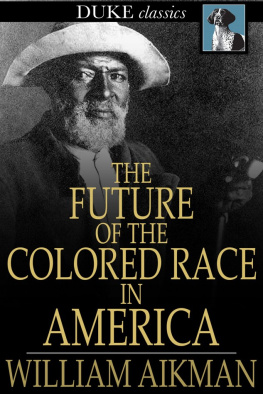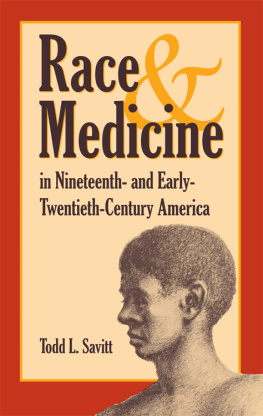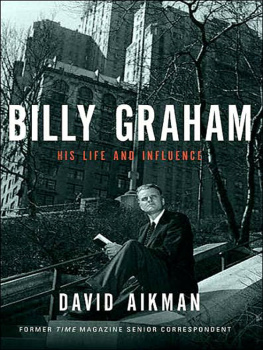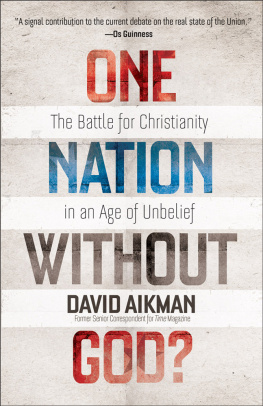William Aikman - The Future of the Colored Race in America
Here you can read online William Aikman - The Future of the Colored Race in America full text of the book (entire story) in english for free. Download pdf and epub, get meaning, cover and reviews about this ebook. year: 2014, publisher: Duke Classics, genre: Science. Description of the work, (preface) as well as reviews are available. Best literature library LitArk.com created for fans of good reading and offers a wide selection of genres:
Romance novel
Science fiction
Adventure
Detective
Science
History
Home and family
Prose
Art
Politics
Computer
Non-fiction
Religion
Business
Children
Humor
Choose a favorite category and find really read worthwhile books. Enjoy immersion in the world of imagination, feel the emotions of the characters or learn something new for yourself, make an fascinating discovery.
- Book:The Future of the Colored Race in America
- Author:
- Publisher:Duke Classics
- Genre:
- Year:2014
- Rating:4 / 5
- Favourites:Add to favourites
- Your mark:
- 80
- 1
- 2
- 3
- 4
- 5
The Future of the Colored Race in America: summary, description and annotation
We offer to read an annotation, description, summary or preface (depends on what the author of the book "The Future of the Colored Race in America" wrote himself). If you haven't found the necessary information about the book — write in the comments, we will try to find it.
Travel back in time to the midst of Civil War-torn America and get a first-hand glimpse into how progressive American thinkers were conceptualizing race relations and grappling with the issue of how African-Americans would fare in the aftermath of the war. This thought-provoking essay from writer and pastor William Aikman is a compelling document of a turbulent period in U.S. history.
The Future of the Colored Race in America — read online for free the complete book (whole text) full work
Below is the text of the book, divided by pages. System saving the place of the last page read, allows you to conveniently read the book "The Future of the Colored Race in America" online for free, without having to search again every time where you left off. Put a bookmark, and you can go to the page where you finished reading at any time.
Font size:
Interval:
Bookmark:

First published in 1862
ISBN 978-1-62013-555-6
Duke Classics
2014 Duke Classics and its licensors. All rights reserved.
While every effort has been used to ensure the accuracy and reliability of the information contained in this edition, Duke Classics does not assume liability or responsibility for any errors or omissions in this book. Duke Classics does not accept responsibility for loss suffered as a result of reliance upon the accuracy or currency of information contained in this book.
BY WILLIAM AIKMAN, Pastor of the Hanover Street Presbyterian Church,Wilmington, Delaware.
In whatever way the present civil war in America shall result, itis certain that the future condition of the colored race in thiscountry will be the question over-mastering all others for manyyears to come. It has already pushed itself into the foremost place.However it may be true, that slavery and the negro were not theproximate causes of this war, no one who gives any candid thoughtto the matter can fail to recognize the fact, that back of all,this stands as the grand first occasion of it. Had there been noslavery, there would have been no war. General Jackson was onlypartly right when he said, that while in his day the tariff wasmade the pretext of secession, and that by and by slavery would takeits place, but that neither would be the true motive of disunion;that a desire for a separate confederacy was the final cause. Thiswas evidently correct, yet had slavery not stood in this countrythere would not have come into being that peculiar state of societywhich now lives in the Southern States, and which demands for itsvery existence that it should rule alone. Slavery has created anaristocracy, not of numbers, but of wealth and power, which bearswith all the social forces. While the slave-holder are but a verysmall minority of the whole people, yet by the force of theirwealth and the fact of their being slave owners, they hold all thepolitical power, and indeed, sweep out of existence any opposition.There are, with very rare exceptions throughout the whole South,but two classesfree and slave, or we may say, slave-holders andslaves, for the non slave-holders are completely lost and absorbedin the all-controlling element which is above them; they workin with it, and are indeed a part of it. As slavery called thisaristocracy into being, and created its power, so it holds it inbeing; anything which strikes at slavery strikes at the root ofthis power; to destroy slavery would be to blot it out of existence.
Around this point the whole contest is waged, and from it aloneevery movement is to be interpreted. In the days of South Carolinanulification the tariff was indeed the pretext of rebellion, andthe true motive was a separate government and the perpetuation ofthe power of the dominant class, but this power depended whollyupon the status of slavery, and so, back of all slavery was eventhen the thought, and to strengthen slavery the great end. Inthis we find the accurate explanation of the studied and persistentefforts to extend and perpetuate it, not because it is admiredin itself, or because it is seen to be politically or sociallybeneficial, but because it is the cornerstone of a valued socialstate. A friend, some years ago sailing down the Potomac, wasengaged in conversation with the captain of the boat, a blunt, bluffSoutherner, and looking over the beautiful scenery on either sideof the river, said, "Why do you Virginians hold on to slavery? it isa thousand pities that such a country as this should be so poorlyused." "I know it," replied the captain, "slavery does ruin thestate; but the fact is, we like it; a man feels good when he ownstwenty or fifty negroes, and can say to one go, and he goes, andto another come and he comes." Here the whole philosophy of thesocial state of the South is in a nut-shell. To abandon slavery isto abandon a position which has been held as a tenure of nobilityfor two hundred years. Nothing but the direst necessity will bringit about. It will never be given voluntarily up; the whole forceof human nature is against it relinquishment. As well might thenobility of England be expected to throw up their titles and theircoronets on persuasion. Here is a case where argument has no power.You may exhaust it, you may prove slavery to be wrong morally, wrongsocially, wrong politically, you may prove it to a demonstrationthat it is an economic blunder of the most gigantic proportions, youmay make it clear as sunlight that it is demoralizing and ruinous,but you have done absolutely nothing toward its abolishment. Hereand there a truly conscientious man or woman, under the greatpressure of duty, will consent to the liberation of their slaves;but the public conscience is so ethereal a thing that it can betouched by no appeals of duty or obligation, and will never forcea community up to any great work, least of all to such a work asthis.
The effect of emancipating one's slaves upon the social positionof the master, has been seen over and over again; the hour whenthe bonds are broken and freedom is given is the hour when all theformer associations are given up; expatriation and banishment arethe inevitable results. The generous, or the conscientious emancipatorat once becomes an exile; he has sunk at once out of an aristocracywhose titular power he gave up the moment he ceased to be a slave-holder,and he cannot comfortably abide in even his old home. Here is theexplanation of the vast and unexpected power put forth by thisrebellion, of the unconquered will, of the enormous sacrificesendured; here is the explanation of the seeming insanity of thestruggle, of the unwarrantableness of its acts, of the demoniacfierceness of its rage, and the diabolical malignity and crueltyof its method of war; it is the death struggle of a great socialelement, for which to be conquered is to be ruined and swept outof existence.
No man understood this so well or so soon as the great Nullifier.He was a thinker and a philosopher, and so with great logicalconsistency he became the early author of the doctrine of slavery asnow almost universally held at the South. He startled and shockedthe men of his time by his bold positions in respect to thatinstitution, and was far in advance of his time in his assertionsof its inherent rightfulness, and the determination not onlyto terminate, but to extend, strengthen and perpetuate it. He wasa nullifier because a slave-holder in principle. The one grew outof, and was a part of the other. The maintenance of an oligarchywas the ultimate end, that rested on slavery, and so "state rights"so called, and the divine right of slavery went hand in hand.
This is strikingly evident in the history of the present war. Therapid rise, and the culmination of rebellion in act, was precededby the new annunciation of these doctrines of Calhoun on slavery.We remember well how strange it sounded, and how startling inthe General Assembly of only 1856, when slavery was declared aninstitution not needing to be defended or apologized for, but tobe praised and justified as truly an ordinance of God as marriage,or the filial relation. The church had known no such doctrinebefore, and then spued it out of her mouth, but it was gravely heldand fiercely and impudently avowed. It was followed by secessionas a logical consequence. It is very remarkable how rapid was thechange in public sentiment. This new doctrine of the rightfulnessof slavery swept over the whole Southern States in a few months,politicans philanthropists, ministers, suddenly starting up to findthat they had been all along in error in thinking that slavery wasan evil, and hoping that some day it would be removed, that theyhad been wrong in speaking of being "opposed to slavery in theabstract," it was abstractly not wrong, but right; they had beenmistaken when regretting the circumstances which made emancipationought not to be desire. This change of sentiment an doctrine wasnot gradual, but sudden; it went with telegraphic speed. The reasonwas that events were pressing upon the aristocracy of the South andthreatening its destruction. Slavery had ceased to be a dominantpower in the Federal legislation, and the social state which restedupon it was trembling to its foundation. There was but one thingto be done, and that was the setting up of a new government, thecorner stone of which should be slavery. And this was not accidentalor capricious, but simply a necessity The state of society whichwas sought to be maintained had its origin in slavery, and slaverycould not but be put in the foremost place. Alexander Stephensunderstood both himself and the matter which he had in hand whenhe told the people, and the world that they had hitherto understandthis thing. Before, they had sought to maintain their social stateand only tolerate slavery, they had not seen that all dependedon it; here was the true corner-stone which former builders hadrejected, but which they were now making the head of the corner. Thesecession was a foregone conclusion long enough before it actuallyoccurred: it was so understood throughout the South by thinkingmen, and the sudden spread of the new doctrine on slavery was thenecessary preparation for it.
Font size:
Interval:
Bookmark:
Similar books «The Future of the Colored Race in America»
Look at similar books to The Future of the Colored Race in America. We have selected literature similar in name and meaning in the hope of providing readers with more options to find new, interesting, not yet read works.
Discussion, reviews of the book The Future of the Colored Race in America and just readers' own opinions. Leave your comments, write what you think about the work, its meaning or the main characters. Specify what exactly you liked and what you didn't like, and why you think so.








